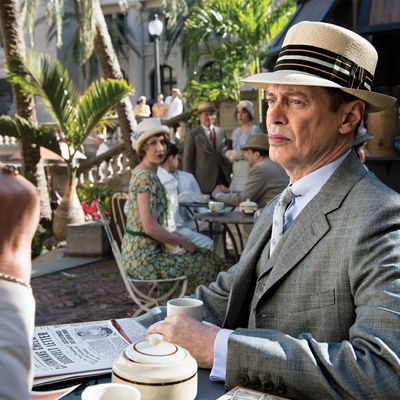
I haven’t seen the entire fifth and final season of Boardwalk Empire, which jumps forward in time to 1931—just the first three episodes sent out for review. They contain no evidence that it’ll rival or exceed season four, an intricately wrought and unexpectedly spare and bluesy batch of hours whose quality exceeded anything that Terence Winter’s gangster saga had given us in seasons one through three.
If anything, season five feels like a regression to tendencies that dogged the show early on. Much of it feels meandering and scattered, and it still has that pay cable drama inclination to go for the big, shocking moments without thinking about their long-term impact on the series as a whole. (The most notorious example is Michael Shannon’s religious psycho treasury agent Nelson van Alden, who murdered a colleague, got a woman pregnant, lost his job, and had to be shoehorned back into the show’s universe by way of Al Capone’s Chicago crew; for a long time it felt like a separate and often pointless show nestled inside the main one, though its black comedy-sitcom moments at least added levity to an often grim program.) The impact of season five’s best subplots — Chalky White (Michael Kenneth Williams) working on a chain gang and trying to get back home somehow; Nucky Thompson (Steve Buscemi) trying to set himself up as a legitimate liquor distributor in anticipation of Prohibition’s repeal; Lucky Luciano (Vincent Piazza) plotting to fill the power vacuum left by the offscreen death of Arnold Rothstein (Michael Stuhlbarg) — is often diffused by the show’s tendency to let a point play out over three or four scenes when one might’ve sufficed. Gillian Darmody (Gretchen Mol), Valentine Narcisse (Jeffrey Wright), Eli Thompson (Shea Whigam), and Margaret Thompson (Kelly Macdonald) all return, though only one of them makes a strong impression.
This season also spends (or so it would appear from the first three episodes) too much time on sepia-tinted flashbacks to Nuck’s childhood as he gets in good with the Commodore (who was played in his dotage by Dabney Coleman). Coupled with somewhat sludgy intrigue in Havana featuring Nucky and his main squeeze, businesswoman Sally Wheat (Patricia Arquette, who spends too much screen time watching Nucky talk), it all feels too much like a protracted homage to The Godfather, Part II, a masterpiece that lesser filmmakers invoke at their peril. (I can think of at least five characters whose flashbacks would probably be more compelling than Nucky’s; in fact I wouldn’t mind a whole prequel series about Chalky’s rise.)
I’m not especially alarmed by any of this, though, because Boardwalk was always a slow-burn series that rallied in its final three episodes, and because it’s one of the most lavishly mounted period dramas in TV history, and this is the last batch of episodes. If four proves to be a qualitative anomaly, and if the fifth season of Boardwalk plays out more or less like the first three — mostly gangster pissing matches and political power grabs interrupted by domestic interludes, but so expertly photographed, directed, production-designed, costumed, lit, and acted that you want to immerse yourself anyway — I’ll be satisfied. I know what the show is at this point, and I’ve quit expecting it to be anything else.
Familiarity counts for a lot, especially on TV. It’s a source of comfort, even when the work of art in question is uncomfortable (or imperfect). When you realize a show with a particular vision and worldview is not going to be around forever, you savor the final stretch, and whenever the show does that thing it always does, you smile. The pleasure of having your knowledge of the show confirmed is a source of pleasure even if some part of you longs for more variation. If you watch Boardwalk long enough, know that the tall, rich, confident Irishman that Nucky talks to will be revealed as Papa Joe Kennedy, and that when a scene starts with a closeup of a radio playing a lighthearted comedy program, it’ll end on a shot of somebody weeping, or that if a bunch of gangsters are having a powwow in a cafe and they all start puffing their chests out and a love song comes on the radio, somebody’s about to get whacked. You know that for every line that sounds like a junior-league attempt at a Godfather aphorism (“wanting something and achieving it are two very different things”) there’ll be a quotable malapropism (a gangster deprived of options gripes “We have no intercourse whatsoever”) or a genuinely witty exchange (when Sally asks Nucky “what rock” he found Joe Kennedy under, Nucky replies, “He’s a Wall Street man”). You know that when a lone smart-ass dares to question the orders of a gang boss surrounded by sycophantic underlings, and everyone laughs at the smart-ass’s audacity, by the end of the scene he’ll either be dead or added to the payroll. You know that when an episode closes with an elaborately choreographed closeup of a mutilated corpse, the credits will play out over a song that Minnie Mouse would shimmy to. These are the sorts of storytelling tics that a viewer can hang a stylish hat on.





